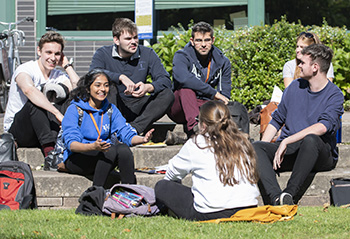Peer support

One aspect of WMS life that our medical students often praise is the level of peer support on offer. Students in the older years run frequent teaching sessions, 'medic parent' schemes, and organise further training through societies - all to help first years get to grips with course material, and to support each other as they progress through the degree. Here are just a few of the opportunities available:
Student Seminars
Multiple groups of Phase II students host weekly sessions to review and re-teach the Phase I content. Each group focuses on different areas; core concepts, 'high-yield' topics, tips and tricks for complex information, a focus on or mix of any of the themes, or will review particularly difficult areas raised by the students. Peer teaching helps first years tackle tricky course material from a students' perspective, and encourages older years to develop their teaching skills.
Seminars are intended to be flexible, so there is a seminar option for all student needs; you can start attending at any point in the year, on any week day, in person or via Teams, or choose particular blocks to attend for if struggling with a certain topic. Find out more
Clinical Skills Group
This peer-teaching initiative runs weekly evening workshops to practice the material students cover during their clinical skills sessions. Peer-teachers will focus on practising the examination sequence and consultations covered in the previous week, break down the components and relate it to the pathologies being examined for, and provide exam-conditions practice sessions in the run up to OSCEs.
It's a great opportunity to practise these skills on each other and in front of others, and receive constructive feedback.
Non-Science Peer Teaching
A peer-teaching group specifically provided for, and taught by, students without a biological science background. There is no assumed prior knowledge, judgement, or such thing as a silly question here.
Peer-teachers provide an introductory session during Welcome Week, before running weekly sessions in the main lecture theatre - so there's no capacity on attendance. Science students are still welcome to attend, if they remain mindful that the sessions are designed for those who studied art, history, law, humanities - any non-biomed background!
There is also an ‘ask any question’ anonymous online query tool. Find out more
 Societies and Networks
Societies and Networks
Resuscitation for Medical Disciplines: RMD Warwick is a basic life support, automatic external defibrillator and first aid course. This course is primarily for first-year students on the MBChB programme, but remaining spaces are available for students in other years and courses at Warwick.
WMS Surgical Society: The Surgical Society runs anatomy days every block which cover the tricky or key aspects of that block’s anatomy content. They also run anatomy revision days closer to exams.
MedSoc: MedSoc runs physiology days which, like anatomy days, cover the tricky or key aspects of a particular block’s physiology content. There are also revision days closer to exams.
MedGuide: A website founded by students Daniel Mercer and Jonathan Loomes-Vrdoljak for the purpose of online peer-support, by and for medical students. With quality assurance processes, and student editor review, they reached two thousand questions in their first year and average several hundred views each week
WMS Disability NetworkLink opens in a new window: A student-led group that advise on, signpost, and advocate for any disability or accessibility concerns you have. They have study resources aimed at students with Specific Learning Differences, and undertake research and quality and curriculum projects to improve student experience.
 The student perspective
The student perspective
'My favourite thing about Warwick is how supportive the students are of one another. There are some excellent peer teaching schemes which I have got involved in both as a student and as a teacher, and found them to be a real asset.'
Georgina Mynott
'Once I started I knew I would have to do more work than the biomedical sciences students to catch up, but there was a lot of support available, including some excellent peer support tailored to non-science background students.'
Jack Brophy
'There are a lot of opportunities to do extracurricular things here and the students are very active. There's good peer support as well from other students.'
Susanna Kallioinen
'It can sometimes be overwhelming but it's really great to know you’re never alone. Both staff and students are so willing to offer support. Students in higher years run seminars and lecturers and are happy to be e-mailed questions.'
Hannah Boyle
'The whole cohort is very supportive and friendly, and older years are more than happy to help lower years. It's not competitive at all - students are always willing to lend a helping hand.'
Amy Coats
